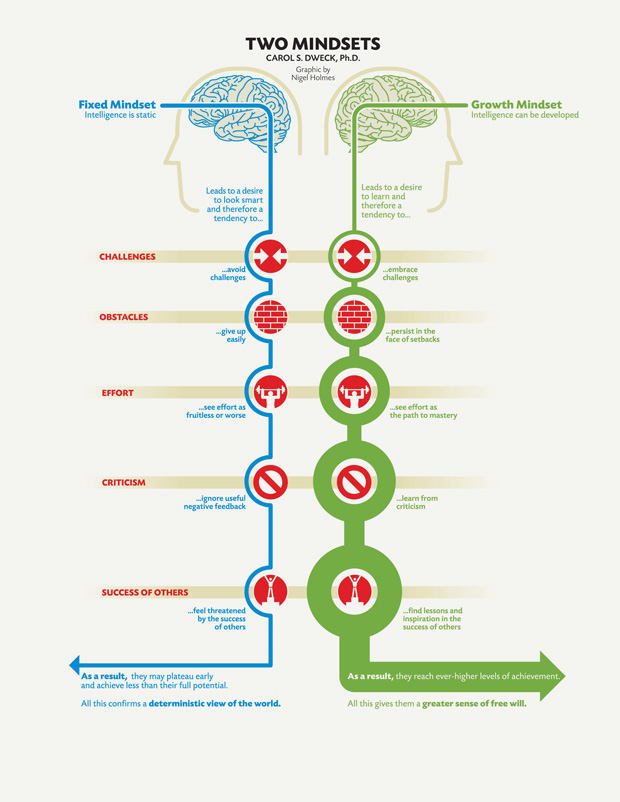Thinking About Thinking
Week 3
Growth vs. Fixed mindset & Gregoric Thinking Styles
October 3, 2014
Have you ever had one of those humbling moments when you realize you have certain faults that are holding you back? We’d like to hope those moments are few and far between, but if you are open to them they can actually be incredible teaching tools that help you grow. One of these moments is exactly what lead me to DBC and motivated me to make the most of my time here.
To be honest, I’ve never really thought much about patterns in my thinking or how my mind typically works. I always assume I look at most things fairly and objectively. But in DBC’s prep work I read about the ideas of Thinking Styles and the Fixed vs. Growth mindset and immediately saw some of these patterns in my own thinking. I realized I wasn’t necessarily approaching problems in the most productive way.
A “fixed mindset” is the idea that knowledge and intelligence is static and that each person is born with specific skills. To people with fixed mindsets, success means manifesting these skills. But this can lead to the tendency to avoid challenges, strive only for external approval, and not grow and learn – basically become stagnant. Someone with a “growth mindset,” on the other hand, believes that no person is more capable than another, that new skills can be learned through embracing challenges, and that intelligence can be developed with hard work.

When I read about these two mindsets I noticed some unsettling fixed mindset tendencies in myself. Before applying to DBC, I had become bored with my work and somewhat pessimistic about my occupation. I was working in journalism and marketing because I gravitated toward writing and working with ideas. But I was starting to find the work rote and uninspiring. I became bitter about my engineer friends who were loving their work. Because writing jobs were all I knew, I only sought opportunities that reinforced this view of myself. I thought writing was all I was good at and that engineers were born with a certain mindset that I simply didn't have. Of course, this outlook was keeping me from learning anything new.
I also didn’t realize I may have a specific thinking style until I took the Gregoric Thinking Styles test. I can see how I am somewhat Abstract Sequential because I like to work with big ideas in a very logical way. I also like working in a structured environment where I know what the guidelines are, which is a trail of a Concrete Sequential thinker. However, I don't buy into the idea that these styles define me and I disagree with putting myself in a box. Although I don’t fit squarely in these styles and there is plenty of crossover – I consider myself creative, diplomatic, and empathetic, for example – I can see some overarching patterns.
The biggest challenge in Phase 0 has been dealing with an unstructured environment. When working mostly on my own, it’s hard to know if I’m on the right track toward learning something. I find it comforting to follow specific instructions, and although there is a great Phase 0 curriculum we are mostly on our own in figuring out problems. This lack of a structured environment can be unsettling to me.
But recognizing my thinking patterns means I can see how they can hurt me. For example, my structured thinking make me adverse to freely experimenting and playing with a problem – I just want to be straightfoward in solving it. But experimenting can expose me to new ways of looking at the problem. Approaching something from a different angle may help me see an aspect of the problem I would normally overlook.
So far, Phase 0 has been challenging and illuminating, with lots of frustration and some exciting breakthroughs. I've learned plenty about web development already, but I've also seen where some of my shortcomings are realized how I can often get in my own way. Being aware of these tendencies helps me stay open to learning in different ways.



